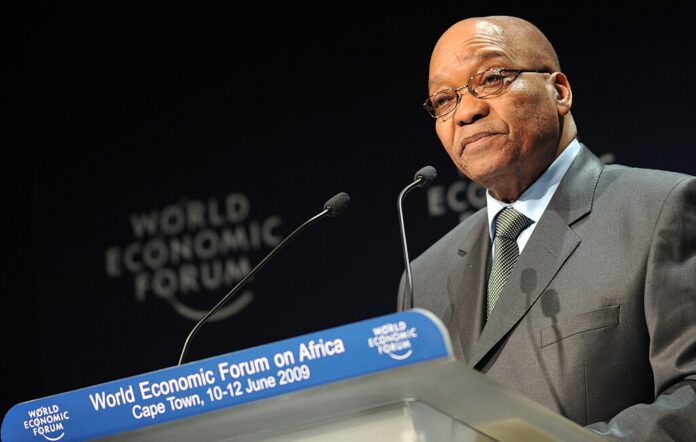Jacob Zuma honoured the late Pravin Gordhan at a funeral service, sharing a personal story of borrowing money from Gordhan to flee to Eswatini during apartheid
Jacob Zuma, leader of the uMkhonto weSizwe party (MKP), recently paid tribute to the late Pravin Gordhan at a poignant funeral service. Gordhan, who served as South Africa’s public enterprises minister, passed away at the age of 75 after a brief battle with cancer. Zuma’s tribute, delivered amidst the sombre occasion of remembering six MK Party members who perished in a tragic bus accident, included a personal revelation about his past interactions with Gordhan.
Speaking at the service, Zuma reflected on Gordhan’s role as a close ally and supporter during the turbulent years of apartheid. He shared a surprising and heartfelt anecdote about borrowing money from Gordhan in the 1970s. Zuma recounted how he approached Gordhan, then working at a pharmacy, to request financial assistance for an urgent escape to Swaziland. The story elicited laughter and astonishment from the attendees.
Embed from Getty Images“I went to borrow money from him,” Zuma said, recounting his desperation and Gordhan’s willingness to help. “I told him I needed a certain amount of money to get to eSwatini and promised I would return. I asked him not to tell anyone.” Zuma’s plan was to leave on a Friday and come back by Sunday. However, upon reaching Swaziland, he was advised not to return immediately due to the arrest of two ANC members.
The funeral service, held in memory of the six MK Party members who died en route to a commemorative event for Zuma’s late wife, Getrude Sizakele Khumalo, known as Makhumalo, was marked by emotional tributes and shared memories. Zuma also honored Makhumalo for her active role in the liberation struggle and advocacy for women’s rights during apartheid.
Gordhan, remembered fondly by Zuma and many others, was a prominent figure in South Africa’s political landscape. His legacy includes significant contributions to public service and the struggle against apartheid. Zuma’s candid remarks at the service provided a glimpse into their deep camaraderie and the personal sacrifices made in the fight for freedom.
Analysis
Political Perspective: Jacob Zuma’s tribute to Pravin Gordhan, including his anecdote about borrowing money to escape arrest, underscores the intertwined nature of personal relationships and political activism during apartheid. This personal story highlights the solidarity and mutual support among anti-apartheid activists. The revelation also serves to humanize Gordhan, who is remembered not only for his political achievements but also for his personal generosity and commitment to the struggle. Zuma’s comments are likely to resonate with the public and reinforce Gordhan’s image as a dedicated and supportive comrade in the fight against apartheid.
Social Perspective: The funeral service and Zuma’s remarks offer a reflection on the personal sacrifices and close relationships that defined the anti-apartheid movement. Sharing such intimate details helps to underscore the collective struggle and solidarity among activists. The story of borrowing money highlights the everyday challenges and risks faced by those involved in the liberation struggle. Zuma’s tribute also serves to celebrate Gordhan’s contributions to South Africa’s social and political fabric, reminding the public of the human stories behind historical events.
Racial Perspective: The personal anecdotes shared by Zuma about Gordhan touch on the broader racial and political context of apartheid South Africa. Gordhan’s role in supporting fellow activists like Zuma underscores the importance of solidarity among individuals fighting against systemic racial oppression. By emphasizing Gordhan’s assistance, Zuma highlights the crucial support networks that existed within the anti-apartheid movement, which were essential for navigating the racial and political dangers of the time.
Gender Perspective: Although Zuma’s tribute primarily focuses on Gordhan and his own experiences, the mention of Makhumalo’s advocacy for women’s rights provides an important gendered perspective. Makhumalo’s role in the liberation struggle and her efforts to promote women’s rights illustrate the significant contributions of women to the fight against apartheid. This recognition of her activism complements the broader narrative of the diverse and inclusive nature of the struggle for freedom and equality.
Economic Perspective: The anecdote about borrowing money from Gordhan highlights the financial challenges faced by activists during apartheid. It reflects the economic hardships and resourcefulness required to support the anti-apartheid movement. Gordhan’s financial assistance to Zuma illustrates the informal support systems that helped sustain activists through difficult times. The story also sheds light on the broader economic dynamics of resistance, including the personal sacrifices made by individuals to support the collective cause.
